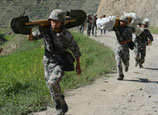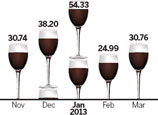
JERUSALEM, July 23 (Xinhua) -- Israeli and Palestinian leaders have, separately, in the past few days called for national referendum on any future peace deal, in a bid to cool down the criticism they both receive after being deemed as mulling concessions under Washington's intensified mediating efforts, if not pressures.
After U.S. Secretary of State John Kerry said Friday Israeli and Palestinian negotiators were to meet in Washington soon, Israeli Prime Minister Benjamin Netanyahu reiterated Sunday that any future peace plan with the Palestinians would be brought to a referendum, while Palestinian President Mahmoud Abbas made a similar pledge Monday.
Kerry did not mention whether either side had already nodded to each other's preconditions for peace. While analysts do not think well of that, they believe, given that any possible deal would involve very difficult compromises for each side, it is a good idea to inherit a decision from the public.
"Beyond politics and beyond coalitions on each side, if there is a final status agreement or any kind of agreement which brings substantial concessions, there is a need to ask the people, there is a need to have an approval," said Prof. Menachem Klein of Bar- Ilan University.
FOR NETANYAHU: BALANCING BETWEEN POLITICIANS, AVOIDING RABIN'S MISTAKES
It should be noted that the proponents of a referendum in the Israeli government are from the right, such as Netanyahu and head of the Jewish Home party, Naftali Bennett, who hope a referendum would result in blocking a peace deal.
But what they face is a combination of challenges, as opinion polls show a majority of Israelis do support a peace deal, despite not trusting Abbas, and an obstacle emerged after chief negotiator and Justice Minister Tzipi Livni said she objects to holding such a public vote.
"Referendum is an evasion of the decision-makers' responsibility," she said, adding "the public elected us to make courageous decisions. When we go to war, we don't ask people, and it should be the same when it comes to a diplomatic settlement."
According to Klein, Netanyahu, by calling for a referendum, might also be hoping to avoid the mistakes made by Yitzhak Rabin, the ex-Israeli prime minister who oversaw the negotiations of the Oslo agreements in the early 1990s, which led to the establishment of the Palestinian National Authority and who was eventually murdered by right-wing activists Yigal Amir in 1995.
Rabin did not seek a referendum and was only able to secure a majority by a single vote in the Knesset parliament by convincing a member of the right to switch side by the promise of a ministerial post in the next government, a decision that was, and remains, hugely controversial.
"Rabin made a mistake not bringing Oslo [I] in September 1993 immediately to a referendum for approval and then asking the people to endorse the whole process that Oslo put down of five years and then a final status agreement," Klein said, adding that "then Rabin made another mistake not bringing the Oslo II agreement in September 1995 to a vote."
FOR ABBAS: HESITATING DUE TO LEGITIMACY, TRYING TO BE DEMOCRATIC
As Netanyahu strives to keep his government together due to the prospect of the peace talks, Abbas is also challenged by his rival Hamas movement that threatens to take reconciliation to collapse if negotiations with Israelis move on, while he is also running hard to retain people's trust.
Prof. Bassem Zbeidi of Birzeit University in Ramallah said Abbas is aware of the fact that he is running out of legitimacy, and that explains the sense of hesitation on his part to say "Well, I have the right to do this and that on my own without going back to the people."
Abbas's term as president of the Palestinian National Authority ended in 2009. But due to the split between Fatah and Hamas in 2007, it has not been possible to hold any elections, so Abbas remained in office. However, the stalemates with both Israel and Hamas led to his declining popularity, especially after the Palestinian economy began to cripple.
"Abbas is holding the stick from the middle in a way by sending a message to the Israelis that it's not going to be an easy thing to sell the Palestinians if the Israelis continue to taking these very hard positions regarding the question of land and sovereignty, " Zbeidi said.
Abbas "wants to make a point that he is aware of the Arab Spring since the whole issue was, or is, about democracy that he is running affairs in a democratic way," said Zbeidi.
"Abbas isn't strong enough to reject that American pressure to go for negotiations (but) he is keeping in his hand the possibility of going back or leaving the negotiations if the Palestinians public chooses that," he added.
















 China builds 'world's tallest building'
China builds 'world's tallest building'


![]()
